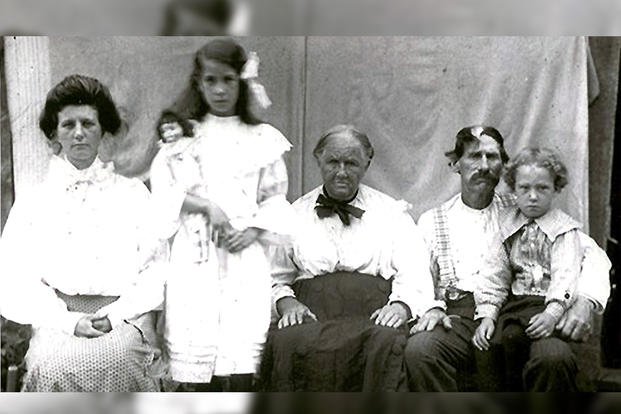
Civil War veteran Moses Triplett, second from right, with his first wife, Mary, sitting to his left. After Mary's death in the 1920s, Triplett married Elida Hall, 50 years his junior.
Posted on 06/03/2020 8:36:37 PM PDT by rxsid
Last Person to Receive a Civil War Pension Dies at 90
The Department of Veterans Affairs' motto is "to care for him who shall have borne the battle and for his widow, and his orphan."
The meaning of those words was perhaps never more apparent than in the case of Irene Triplett, who died Tuesday from surgical complications following a fall at a North Carolina nursing home, according to The Wall Street Journal. She was the last person to receive a pension from a veteran's Civil War service.
Her father, Mose Triplett, fought on both sides of the Civil War, first as a rebel and later as a Yankee. Mose realized he was on the losing side after falling ill before the Battle of Gettysburg. Almost 92% of his unit, the 26th North Carolina Infantry, was wiped out in the fighting.
The decision to switch to the Union Army did more than save his life; it earned him a VA pension, one that has paid out every month since the end of the war in 1865.
Decades after Mose left the Army, he married Elida Hall -- his second wife. A few years later, they had a baby. Hall was only 34 years old when she gave birth to Irene in 1930. Mose was 83.
When Mose died in 1938 at the age of 92, his pension was extended first to his wife, then to Irene. Every month since, the VA has paid Irene Triplett $73.13. By the time of her death, the family had been collecting the pension for 155 years.
(Excerpt) Read more at military.com ...

History, as it always does, fades away and into the history books.
Well old Mose and his family did better than two of my great-grandfathers who battled government bureaucracy for years after the war before finally getting their $5 a month Civil War service pensions.
“Her father, Mose Triplett, fought on both sides of the Civil War, first as a rebel and later as a Yankee. Mose realized he was on the losing side after falling ill before the Battle of Gettysburg.”
He realized that the CSA Pension may not pay out.
Switching sides used to be called being a traitor.
Some didn’t want to be on the side they were on in the first place, having been pressed in because neighbors knew each other and would quickly notice anyone who didn’t rally to the flag, so to speak. Such men had to choose on the spot knowing their families would bear the brunt if they chose wrongly, and had to bide their time to get out of Dodge. In the small towns people probably already knew your family’s leanings from chatter before hostilities formally broke out [like our chatting on social media now] and once the war started they were going to keep a close eye on you or run you off your land and would demand some example of loyalty or force you to be complicit and join.
Historically it’s not really quite so simple when speaking of the Civil War. It’s difficult to understand today, but prior to the war, very few people thought of themselves as Americans. Most people owed allegiance to their state more so than to the US. If you asked someone where they were from, more than likely they’d call themselves a Virginian, a Pennsylvanian, or a New Yorker, rather than an American.
For those living in the states that seceded this posed a quandry — either you had to support your state of the USA. Either way, you’re a traitor! For most, the easiest and most natural decision was to support your state. That’s the reason, for example, Robert E. Lee turned down a commission in the Union Army. He could not bring himself to fight against his home state of Virginia.
Someone like this soldier hardly could be blamed for fighting for his home state. It’s really to his credit though that he realized eventually that he was fighting for the wrong side and for a futile cause.
True statement.
Just in time to issue a brand new batch of pensions for Civil War II.
“Civil War veteran Moses Triplett, second from right, with his first wife, Mary, sitting to his left.”
What is she? 10 years old? Looks more like his granddaughter.
Mose may have been a conscript.
A great many of the men serving in the Confederate Army were drafted men who lived in the South but had no slaves and were opposed to slavery.
I have read of many such conscripts that switched sides when the opportunity presented itself.
Many poor men in the South considered the Civil War a rich man’s war that the poor died fighting.
I believe that constitutionally the South had the right to secede, but I also believe that the Civil War was a rich man’s war from the vantage point of the Southern common man. You had to be at least an upper middle-class man to own even a single slave. If you were drafted, you could pay another man to serve for you. There were plenty of reasons for a poor man to want to switch sides.
“A great many of the men serving in the Confederate Army were drafted”
By wars end. about 13% of the Confederate Army had been drafted into that army. The balance, 87% were volunteers.
In the Union Army it was about 10% drafted.
“Hall was only 34 years old when she gave birth to Irene in 1930. Mose was 83.”
Why do I think Hall was having some ‘action on the side’?


The right to independence is not a futile cause.
Disclaimer: Opinions posted on Free Republic are those of the individual posters and do not necessarily represent the opinion of Free Republic or its management. All materials posted herein are protected by copyright law and the exemption for fair use of copyrighted works.